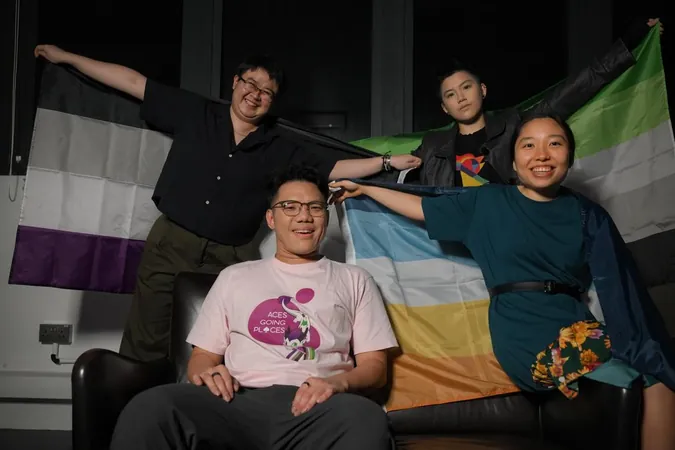
Unveiling Asexuality: What It Means to Be Asexual in Singapore
2025-05-25
Author: Nur
A Journey of Self-Discovery
At just 16, Wayn Lau began to feel different from his peers. While others explored romantic and physical relationships, he felt more akin to friendship. Now 25 and a freelance artist, Lau shares, 'I sensed I wasn’t straight, but terms like gay or bisexual didn't resonate with me.' Seeking understanding, he turned to romance novels until a YouTube video about being 'aro-ace' – a blend of aromantic and asexual – illuminated his path.
Breaking Down Asexuality and Aromanticism
Aromantic individuals experience little or no romantic attraction, while asexuals feel the same about sexual attraction. Lau, who identifies as aro-ace, aligns with a growing community in Singapore named Aces Going Places, which boasts over 300 members since its inception in 2016. Yet, many asexual individuals may still feel isolated.
Understanding the Attraction Spectrum
The Aces community embraces the idea that asexuality and aromanticism exist on a spectrum. Founder Teng Yong Ping, 39, describes himself as both gay and asexual, enjoying companionship without the pressure of sexual encounters. Misunderstandings about asexuality are rampant, as friends often dismiss it with comments like, 'You just need to find the right person!'
The Quest for Recognition
As societal norms prioritize romantic relationships, aromantic and asexual individuals can feel marginalized. Dr. Ang Ming Wei, a PhD candidate studying relationships, notes that the stigma surrounding asexuality can lead to feelings of alienation. Lau highlights a society steeped in traditional expectations regarding adulthood, love, and marriage.
A New Age of Awareness
For many, the internet serves as a lifeline. Lyndon Ang, 29, discovered asexuality through online communities on platforms like Tumblr, realizing they were not alone. Similarly, a 2022 YouTube video helped a software engineer, known as Ms. Li, connect with her own identities of being aro-ace.
Challenging Preconceptions
The belief that asexuality is synonymous with celibacy or repression is ingrained in many minds. Aces, including Lau and Teng, stress the importance of emotional connections, which contradicts assumptions that they lack feelings. Misdiagnosis is a frequent issue, where asexuality is wrongly treated as a dysfunction.
Building Meaningful Relationships
Contrary to misconceptions, asexual and aromantic individuals value deep companionship. Li, who has been in a 1.5-year relationship, emphasizes that bonds can be built on trust and mutual respect without sexual attraction. 'You can still want a family and children,' she explains.
Community and Companionship
Aces Going Places not only fosters friendships but provides a welcoming environment where members can be themselves without explanations. Monthly meetups, filled with food and games, create a no-pressure space to connect. Teng recalls how the community has evolved since its beginnings in 2016 to now hosting larger gatherings.
Embracing Identity Together
The presence of the aces community is growing. At events like Pink Dot, individuals like Ang have witnessed firsthand the impact of representation when members connect and discover they are not alone. Ms. Li described her first meetup as 'mind-blowing,' reinforcing the validity of her identity.
A Celebration of Diversity
For those navigating their asexual or aromantic identities, Aces Going Places stands as a symbol of acceptance. It is a reminder that diversity in love and connection exists, challenging societal norms and breaking down barriers.






 Brasil (PT)
Brasil (PT)
 Canada (EN)
Canada (EN)
 Chile (ES)
Chile (ES)
 Česko (CS)
Česko (CS)
 대한민국 (KO)
대한민국 (KO)
 España (ES)
España (ES)
 France (FR)
France (FR)
 Hong Kong (EN)
Hong Kong (EN)
 Italia (IT)
Italia (IT)
 日本 (JA)
日本 (JA)
 Magyarország (HU)
Magyarország (HU)
 Norge (NO)
Norge (NO)
 Polska (PL)
Polska (PL)
 Schweiz (DE)
Schweiz (DE)
 Singapore (EN)
Singapore (EN)
 Sverige (SV)
Sverige (SV)
 Suomi (FI)
Suomi (FI)
 Türkiye (TR)
Türkiye (TR)
 الإمارات العربية المتحدة (AR)
الإمارات العربية المتحدة (AR)